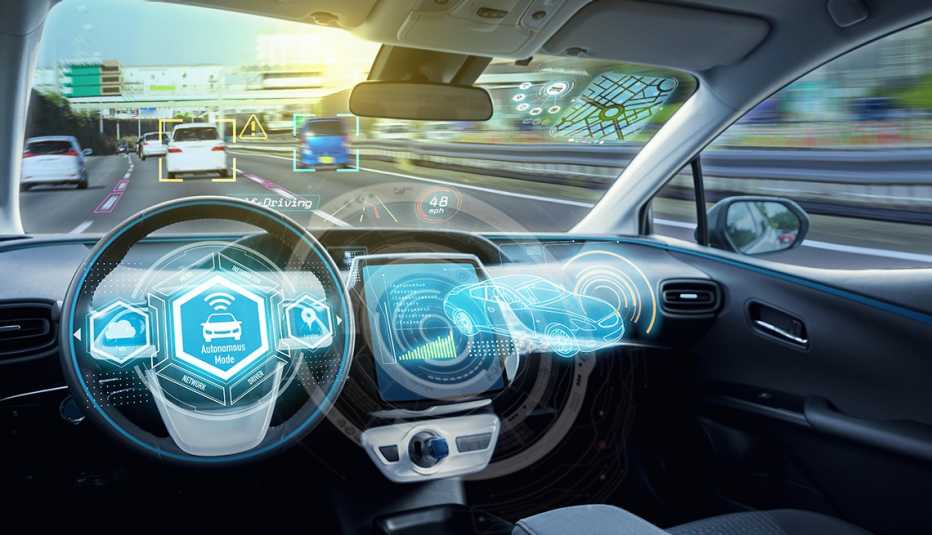
In the realm of automotive innovation, self-driving cars represent a leap towards the future. Yet, as this technology progresses, so does the complexity of legal and safety concerns.
When accidents occur involving these autonomous vehicles, understanding the unique challenges they present is crucial.
Facts About Self Driving Car Accidents
| Statistic | Value | Description |
|---|---|---|
| Accident Rate (Driverless vs. Traditional) | Driverless: 9.1 / Traditional: 4.2 (per million miles) | Driverless vehicles have more than double the accident rate per million miles driven compared to traditional vehicles. |
| Consumer Concerns | 93% | A large majority of Americans express concerns about safety and technology malfunctions in self-driving cars. |
| Unwilling to Own/Use | 51% | Over half of consumers are somewhat or very unlikely to own or use a self-driving vehicle in the next five years. |
| Trust with Loved Ones | 61% | A significant majority of Americans wouldn’t trust a self-driving car with their loved ones or children. |
| Willing to Pay a Premium | 29% | Only a small fraction of consumers would be willing to pay a premium for a self-driving vehicle. |
| Confidence Lost in Tesla | 62% | A majority of consumers have lost confidence in Tesla following safety and technology recalls. |
| ADAS Crashes (Tesla) | 69.64% | Over two-thirds of all ADAS crashes in 2022 involved Teslas. |
Self-Driving Technology and Its Impact on Road Safety
Self-driving cars use a combination of sensors, cameras, and artificial intelligence to travel without human intervention. This technology aims to reduce accidents caused by human error—such as speeding, distraction, and fatigue.
Studies suggest that self-driving vehicles could decrease traffic accidents by up to 90%. However, when these vehicles are involved in accidents, the question of liability becomes complex.
Common Causes of Self-Driving Car Accidents
Self-driving cars are touted as the future of transportation, promising increased safety and efficiency on the roads. However, as the technology advances, so too do the challenges and complexities, especially when it comes to accidents involving these autonomous vehicles.
Understanding the common causes of these incidents is crucial for preventing future occurrences and for individuals involved in such accidents to know their rights and potential legal actions.
- Software glitches
- Sensor failures
- Unexpected scenarios
- Human error
- Security vulnerabilities
- Inadequate maintenance
Legal Challenges in Self-Driving Car Accidents
The legal landscape for self-driving car accidents is still evolving. Determining liability is challenging—Is it the manufacturer, the software developer, or the human occupant?
Laws and regulations are developing to address these questions, but it’s a complex process.
The Role of Self-Driving Car Accident Attorneys
In this rapidly changing environment, attorneys specializing in self-driving car accidents are invaluable. They understand the nuances of the law as it applies to autonomous vehicles.
These legal professionals can help victims navigate the complexities of their cases, ensuring they receive the compensation they deserve.
Legal Representation for Self-Driving Car Accidents
Navigating the aftermath of a self-driving car accident requires skilled legal representation. The evolving nature of autonomous vehicle technology brings unique challenges to the legal arena.
A specialized attorney can be crucial in guiding victims through the complexities of their case, ensuring fair compensation for their losses.
Importance of Specialized Legal Representation
Self-driving car accidents are not your typical traffic incidents. They involve advanced technologies and complex legal issues regarding liability and negligence.
Having an attorney who understands these nuances is crucial. They can effectively analyze the case, identify the responsible parties, and build a strong argument on your behalf.
What to Look for in a Self-Driving Car Accident Attorney
When seeking legal assistance, it’s important to choose an attorney with specific experience in self-driving car accidents.
Look for a legal team that stays abreast of the latest developments in autonomous vehicle laws and has a track record of handling similar cases successfully.
Their expertise in this niche area of law can make a significant difference in the outcome of your case.
Steps to Take Immediately Following a Self-Driving Car Accident
If you’re involved in an accident with a self-driving car, take immediate steps to protect your rights.
First, ensure everyone’s safety and call emergency services. Document the scene with photos and gather contact information from witnesses.
Then, contact a specialized attorney as soon as possible to discuss your case.
How Attorneys Evaluate Self-Driving Car Accident Claims
Attorneys specializing in self-driving car accidents evaluate claims based on several factors.
They consider the details of the accident, the extent of the injuries, the potential liabilities of the manufacturers or software developers, and any precedents in similar cases. This comprehensive evaluation helps in building a robust case for their clients.
Understanding Your Rights and Liabilities
Understanding your rights and liabilities in a self-driving car accident can be complex.
An attorney can clarify your legal position, including your right to compensation and any potential liabilities you may face.
They can also advise on the best course of action, whether it’s negotiating a settlement or pursuing litigation.
Negotiating Settlements in Self-Driving Car Accident Cases
Negotiating settlements in self-driving car accident cases requires a unique approach due to the intricate nature of liability and the cutting-edge technology involved. Here are the steps typically involved in this process:
- Gather comprehensive evidence
- Determine liability
- Assess damages
- Engage with insurance companies
- Consider future impacts
- Legal representation
The Litigation Process for Self-Driving Car Accidents
If a settlement cannot be reached, your case may go to court. The litigation process involves filing a lawsuit, presenting evidence, and arguing your case before a judge or jury.
Your attorney will guide you through each step, representing your interests vigorously to achieve a favorable outcome.
Compensation and Claims in Self-Driving Car Accidents
Understanding the compensation and claims process in self-driving car accidents is crucial for victims seeking justice and financial recovery.
This complex process involves determining liability, evaluating damages, and navigating state and federal laws—each step requiring careful attention and legal knowledge to ensure fair compensation.
Types of Compensation Available in Self-Driving Car Accident Cases
Victims of self-driving car accidents may be entitled to various types of compensation. These can include medical expenses for injuries sustained, lost wages due to time off work, and pain and suffering.
Additionally, if the accident resulted in property damage, compensation for repairs or replacement of the vehicle may also be pursued.
Determining Fault and Liability in Self-Driving Car Accidents
Determining fault in self-driving car accidents involves a complex analysis of the vehicle’s technology, the actions of any human operators, and the circumstances leading up to the accident.
Liability may rest with the vehicle manufacturer, the software developer, or other parties involved in the vehicle’s operation.
Legal professionals play a crucial role in identifying liable parties and holding them accountable.
The Impact of State Laws on Self-Driving Car Accident Claims
State laws significantly influence self-driving car accident claims, with each state having its own regulations regarding liability, insurance, and compensation. Understanding these laws is vital for effectively pursuing a claim.
Attorneys with experience in self-driving car accidents can provide invaluable guidance on how state laws affect your case.
The Role of Insurance in Self-Driving Car Accidents
Insurance coverage for self-driving cars is a developing area, with policies evolving to address the unique risks associated with autonomous vehicles.
Navigating insurance claims requires an understanding of how traditional policies apply to self-driving cars and any additional coverage that may be relevant.
Challenges in Proving Negligence in Self-Driving Car Accident Cases
Proving negligence in self-driving car accident cases is challenging due to the involvement of advanced technologies and multiple potential defendants.
Establishing the cause of the accident and linking it to the negligence of a specific party requires detailed investigation and expert analysis. Legal representation is essential for overcoming these challenges and building a strong case.
How Damages Are Calculated in Self-Driving Car Accident Claims
Damages in self-driving car accident claims are calculated based on the extent of the injuries, the impact on the victim’s life, and the cost of property damage.
Economic damages are relatively straightforward, but non-economic damages, such as pain and suffering, require careful assessment.
Potential Defendants in Self-Driving Car Accident Lawsuits
Potential defendants in self-driving car accident lawsuits can include vehicle manufacturers, software developers, maintenance providers, and even other drivers.
Identifying all potential defendants is crucial for maximizing compensation and requires a comprehensive understanding of the legal and technical aspects of the case.
Strategies for Maximizing Compensation
Maximizing compensation in a self-driving car accident case involves meticulous documentation of all losses, skilled negotiation with insurers and defendants, and, when necessary, aggressive litigation.
An experienced attorney can employ strategies tailored to the specifics of your case to ensure you receive the compensation you deserve.
Navigating the Legal Landscape
The legal landscape for self-driving cars is continually evolving, presenting new challenges and opportunities for those involved in accidents with autonomous vehicles.
As legislation and regulations develop, staying informed and understanding the legal framework is essential for effectively managing self-driving car accident cases.
Federal vs. State Regulations on Self-Driving Cars
The United States sees a complex interplay between federal and state regulations regarding self-driving cars.
The federal government primarily focuses on setting safety standards and guidelines, while states have the authority to regulate the registration, licensing, and operation of autonomous vehicles within their borders.
This dual layer of regulation requires a nuanced understanding to ensure compliance and effectively advocate for accident victims.
The Role of the National Highway Traffic Safety Administration (NHTSA)
The National Highway Traffic Safety Administration (NHTSA) plays a pivotal role in overseeing the safety of self-driving vehicles.
The NHTSA issues guidelines, conducts research, and can mandate recalls if safety issues are identified.
Understanding the NHTSA’s guidelines and enforcement actions is essential for navigating legal cases involving self-driving cars.
Legal Precedents Impacting Self-Driving Car Accident Cases
Legal precedents in self-driving car accident cases set important benchmarks for future litigation. These cases can influence how liability is determined, how damages are assessed, and how safety standards are enforced.
Attorneys and legal scholars closely examine these precedents to build effective arguments and advocate for their clients.
Need Assistance With a Self-Driving Car Accident?
If you or someone you know has been involved in a self-driving car accident, it’s crucial to have the right support on your side.
Goldenzweig Law is here to provide the guidance and advocacy you need. As dedicated car accident lawyers in Houston, we’re committed to helping you navigate through the complexities of your case.
Call us today at 713-609-1930 to discuss how we can assist you in securing the compensation you deserve.

